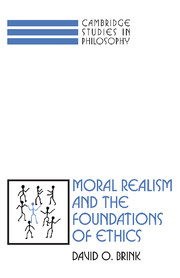Book contents
- Frontmatter
- Contents
- Preface
- 1 INTRODUCTION
- 2 MORAL REALISM AND MORAL INQUIRY
- 3 EXTERNALIST MORAL REALISM
- 4 DOES MORAL REALISM MATTER?
- 5 A COHERENTIST MORAL EPISTEMOLOGY
- 6 MORAL REALISM AND THE IS/OUGHT THESIS
- 7 A POSTERIORI OBJECTIONS TO MORAL REALISM
- 8 OBJECTIVE UTILITARIANISM
- Appendix 1 Must an infinite regress of justification be vicious?
- Appendix 2 Coherence, internalism, and externalism in epistemology
- Appendix 3 The is/ought thesis and intuitionism
- Appendix 4 Rawlsian constructivism
- Bibliography
- Index
5 - A COHERENTIST MORAL EPISTEMOLOGY
Published online by Cambridge University Press: 11 January 2010
- Frontmatter
- Contents
- Preface
- 1 INTRODUCTION
- 2 MORAL REALISM AND MORAL INQUIRY
- 3 EXTERNALIST MORAL REALISM
- 4 DOES MORAL REALISM MATTER?
- 5 A COHERENTIST MORAL EPISTEMOLOGY
- 6 MORAL REALISM AND THE IS/OUGHT THESIS
- 7 A POSTERIORI OBJECTIONS TO MORAL REALISM
- 8 OBJECTIVE UTILITARIANISM
- Appendix 1 Must an infinite regress of justification be vicious?
- Appendix 2 Coherence, internalism, and externalism in epistemology
- Appendix 3 The is/ought thesis and intuitionism
- Appendix 4 Rawlsian constructivism
- Bibliography
- Index
Summary
The kind of moral realism that I have been defending asserts the existence of moral facts and true moral claims. But how could we come to know these facts, and how could we justify moral claims? Many of those who are skeptical of moral realism are skeptical on epistemological grounds. They doubt whether we can have knowledge of objective moral facts, and, in particular, they doubt whether we can justify our moral beliefs. This is another point at which metaethics and general metaphysical and epistemological concerns intertwine.
There are influential general arguments that claim to demonstrate that foundationalism rather than coherentism must be the correct account of justification and that realism requires that foundationalism be true. Traditional defenders of moral realism, such as Clarke (1728), Price (1787), Reid (1788), Sidgwick (1879, 1907), Moore (1903), Broad (1930), Ross (1930), and Prichard (1949), seem to accept these arguments; they combine moral realism with a version of foundationalism to form a metaethical position known as “intuitionism.” (As we saw in Chapter 1, many intuitionists are also nonnaturalists, but this metaphysical claim is not part of intuitionism as I shall understand it here.) But contemporary writers, many of whom accept foundationalism and metaphysical realism, reject the epistemological claims of intuitionism as mysterious or implausible. They conclude that moral realism is false and embrace some form of antirealism. I believe these writers have mislocated objections to intuitionism; intuitionism is no less plausible than foundationalism is generally.
- Type
- Chapter
- Information
- Moral Realism and the Foundations of Ethics , pp. 100 - 143Publisher: Cambridge University PressPrint publication year: 1989
- 2
- Cited by



